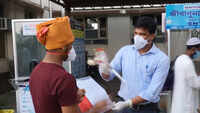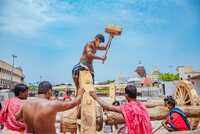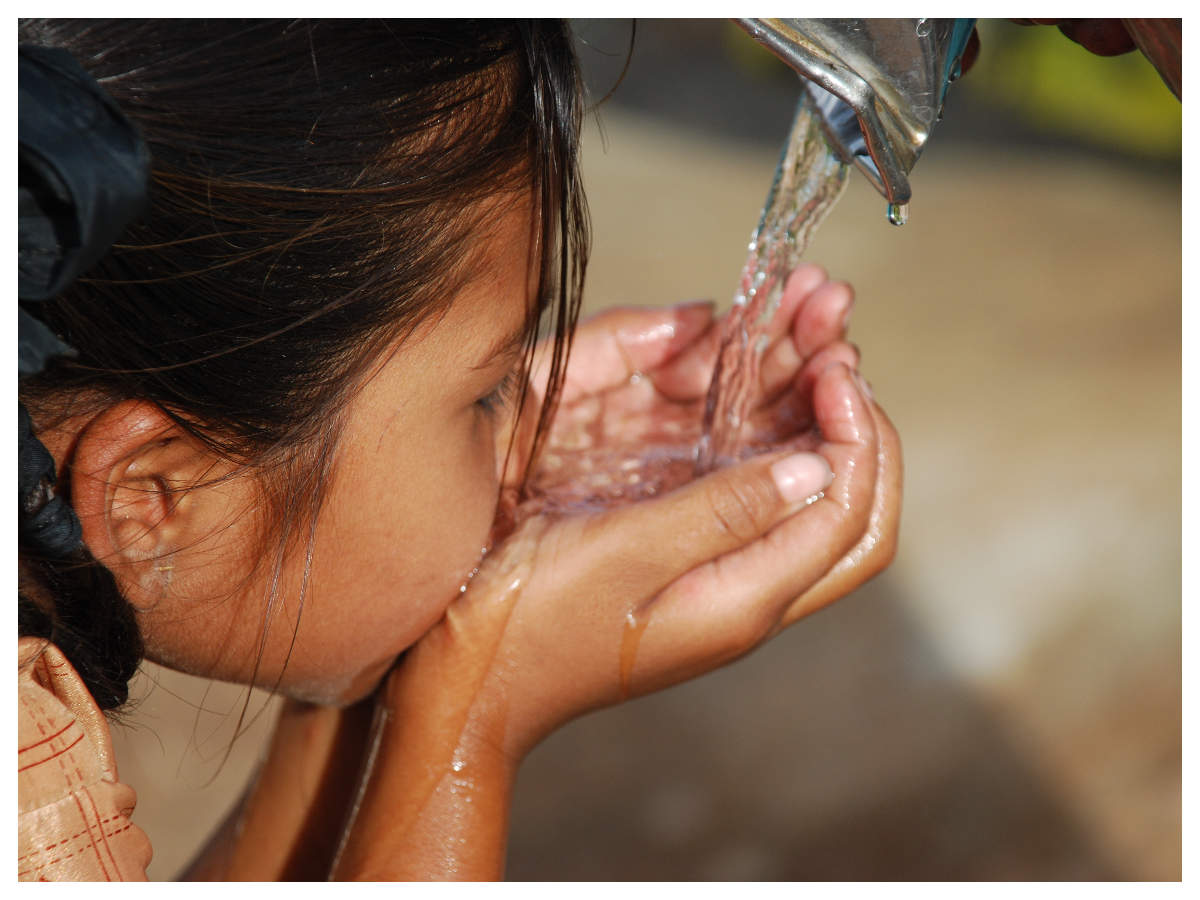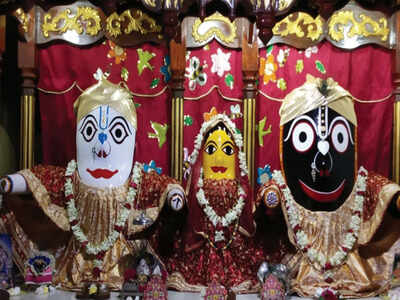
KOLKATA: Ratha Yatra, conducted by the Kolkata International Society for Krishna Consciousness (Iskcon), has been cancelled this year.
The authorities took the decision on Thursday to prevent the gathering of thousands of people on the road to pull the chariots, thereby increasing the risk of spreading the novel coronavirus.
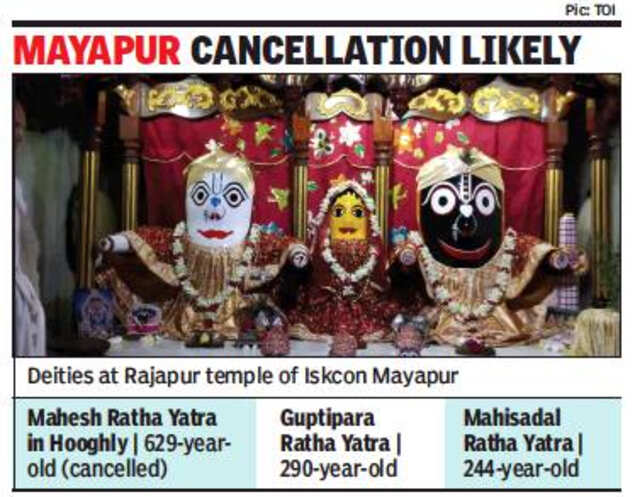
This time, there will be no city tour of the three chariots, a tradition that has been part of the city’s annual calendar for the past 48 years.
The Mayapur headquarters of Iskcon is also likely to cancel Ratha Yatra, though a formal announcement is awaited.
The Iskcon temples in Kolkata and Mayapur will, however, celebrate Ratha Yatra on the premises.
“We will dress up the deities in their first-floor abode and bring them to the ground floor where they will stay for eight days in a temporary set up. Pujas and offerings will be performed there. We will request chief minister Mamata Banerjee to visit the temple on Ratha Yatra,” said Radharaman Das, spokesperson for Kolkata Iskcon.
“We are trying to see if restricted entry to the temple is possible during Ratha Yatra. Social distancing will be an issue and we will have to be careful.” Starting from Albert Road in Kolkata, the three chariots of Jagannath, Balaram and Subhadra, tour the city and then roll into the Maidan, where they are kept for eight days.
A fair is organised by Iskcon there and prasad is distributed among the large number of devotees who converge on the spot. A week later on Ultarath, the chariots are pulled back to the temple.
In Mayapur, Ratha Yatra covered a 6-km stretch from Rajapur, where a Jagannath temple is situated, to Mayapur Dham, where the chariots are kept for eight days.
The decision to cancel the festival came a day before Jagannath’s Snan Yatra on Friday, which sets the mood for the festival. This year, both Kolkata and Mayapur have barred the entry of devotees to witness the Snan Yatra rituals that will be conducted by a few monks staying on the temple premises at both the places.
Mythological details from the Jagannath lore says that to help the God beat the heat, an annual bathing ritual is organised during which the idol is anointed with sandal and bathed in milk and water for more than four hours.
According to the lore, Jagannath comes down with fever the next day, and he has to be quarantined for two weeks before he gets well and sets out for a public darshan on Ratha Yatra.
“Jagannath is given a fever diet of hot milk, fruits, kadha and herbal medication, not the usual chhappan bhog. One can draw parallel to today’s Covid-19 situation,” said Subrata Das, spokesperson for Mayapur Iskcon.
The authorities took the decision on Thursday to prevent the gathering of thousands of people on the road to pull the chariots, thereby increasing the risk of spreading the novel coronavirus.

This time, there will be no city tour of the three chariots, a tradition that has been part of the city’s annual calendar for the past 48 years.
The Mayapur headquarters of Iskcon is also likely to cancel Ratha Yatra, though a formal announcement is awaited.
The Iskcon temples in Kolkata and Mayapur will, however, celebrate Ratha Yatra on the premises.
“We will dress up the deities in their first-floor abode and bring them to the ground floor where they will stay for eight days in a temporary set up. Pujas and offerings will be performed there. We will request chief minister Mamata Banerjee to visit the temple on Ratha Yatra,” said Radharaman Das, spokesperson for Kolkata Iskcon.
“We are trying to see if restricted entry to the temple is possible during Ratha Yatra. Social distancing will be an issue and we will have to be careful.” Starting from Albert Road in Kolkata, the three chariots of Jagannath, Balaram and Subhadra, tour the city and then roll into the Maidan, where they are kept for eight days.
A fair is organised by Iskcon there and prasad is distributed among the large number of devotees who converge on the spot. A week later on Ultarath, the chariots are pulled back to the temple.
In Mayapur, Ratha Yatra covered a 6-km stretch from Rajapur, where a Jagannath temple is situated, to Mayapur Dham, where the chariots are kept for eight days.
The decision to cancel the festival came a day before Jagannath’s Snan Yatra on Friday, which sets the mood for the festival. This year, both Kolkata and Mayapur have barred the entry of devotees to witness the Snan Yatra rituals that will be conducted by a few monks staying on the temple premises at both the places.
Mythological details from the Jagannath lore says that to help the God beat the heat, an annual bathing ritual is organised during which the idol is anointed with sandal and bathed in milk and water for more than four hours.
According to the lore, Jagannath comes down with fever the next day, and he has to be quarantined for two weeks before he gets well and sets out for a public darshan on Ratha Yatra.
“Jagannath is given a fever diet of hot milk, fruits, kadha and herbal medication, not the usual chhappan bhog. One can draw parallel to today’s Covid-19 situation,” said Subrata Das, spokesperson for Mayapur Iskcon.

Coronavirus outbreak
Trending Topics
LATEST VIDEOS
City
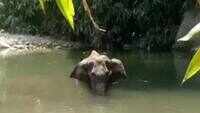 Kerala pregnant elephant killing: Preliminary post-mortem reports out
Kerala pregnant elephant killing: Preliminary post-mortem reports out 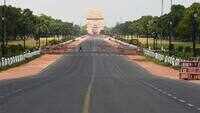 Bigger tremors round the corner in Delhi-NCR?
Bigger tremors round the corner in Delhi-NCR? 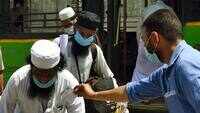 2,550 foreign Tablighi Jamaat members blacklisted by Home Ministry; entry into India banned for 10 years
2,550 foreign Tablighi Jamaat members blacklisted by Home Ministry; entry into India banned for 10 years 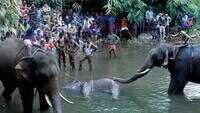 Justice will prevail: Kerala CM Pinarayi Vijayan on killing of pregnant elephant
Justice will prevail: Kerala CM Pinarayi Vijayan on killing of pregnant elephant
More from TOI
Navbharat Times
Featured Today in Travel
Get the app
